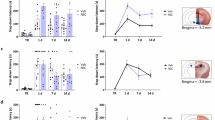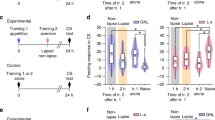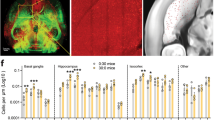Abstract
CURRENT selectional models of learning and memory1–3 suggest that messenger RNA (mRNA) is implicated in biochemical processes in the brain which mediate long term memory. The role assigned to mRNA in these models is that of a carrier of information to the ribosome complex from environmentally stimulated derepressed regions of the DNA molecule. The specific protein molecule or peptide thus produced is supposed to signpost or colour-code neurones in such a way that conduction of subsequent impulses, similar to that which first specified the existence of the molecule, is facilitated. The loss of RNA from such a system should prevent the production of the specific protein molecule and impair the formation of a permanent memory trace, but experiments which have attempted to prevent the synthesis of mRNA by means of actinomycin during avoidance learning have given ambiguous results4–7. We have therefore set out to determine, in an appetitive learning situation, the time after acquisition at which actinomycin becomes effective in impairing memory, the extent of diffusion of the drug vehicle through brain tissue and the effect of the quantities of the drug used on brain RNA synthesis.
This is a preview of subscription content, access via your institution
Access options
Subscribe to this journal
Receive 51 print issues and online access
$199.00 per year
only $3.90 per issue
Buy this article
- Purchase on Springer Link
- Instant access to full article PDF
Prices may be subject to local taxes which are calculated during checkout
Similar content being viewed by others
References
Hyden, H., in Neurosciences Research Symposium Summaries, 1, 278 (edit. by Schmitt, F. O., and Melnechuk) (MIT Press, 1966).
John, E. R., Mechanisms of Memory (Academic Press, New York, 1967).
Roberts, R. B., and Flexner, L. B., Quart. Rev. Biochem. Biophys., 2, 135 (1969).
Barondes, S. H., and Jarvik, M. E., J. Neurochem., 2, 187 (1964).
Cohen, H. D., and Barondes, S. H., J. Neurochem., 13, 207 (1966).
Appel, S. H., Nature, 207, 1163 (1965).
Squire, D. R., and Barondes, S. H., Nature, 225, 649 (1970).
De Groot, J., Verhandel. Konink. Ned. Akad. Weltenschap. Afdel-Natuurk, Sect. 11, 52 (1959).
Tenen, S. S., Science, 148, 1248 (1965).
Winer, B. J., Statistical Principles in Experimental Design (McGraw-Hill, 1962).
Daniels, D. J., Comp. Phys. Psychol. (in the press).
Barondes, S. H., and Cohen, H. D., Proc. US Nat. Acad. Sci., 58, 157 (1967).
Daniels, D., thesis, Univ. Bristol (1970).
Myers, R. S., Physiol. and Behav., 1, 171 (1966).
Scherrer, K., and Darnell, J., Biochem. Biophys. Res. Commun., 7, 486 (1962).
Author information
Authors and Affiliations
Rights and permissions
About this article
Cite this article
DANIELS, D. Effects of Actinomycin D on Memory and Brain RNA Synthesis in an Appetitive Learning Task. Nature 231, 395–397 (1971). https://doi.org/10.1038/231395a0
Received:
Revised:
Issue Date:
DOI: https://doi.org/10.1038/231395a0
This article is cited by
-
Role of RNA and protein in memory storage: A review
Behavior Genetics (1974)
Comments
By submitting a comment you agree to abide by our Terms and Community Guidelines. If you find something abusive or that does not comply with our terms or guidelines please flag it as inappropriate.



